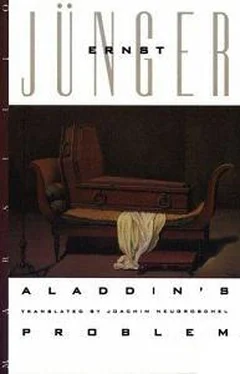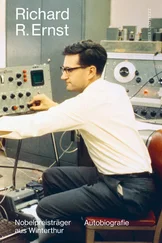First a piece of land had to be found — one that was as cheap as possible, perhaps even gratis. Participation by the owners could even be considered. Jersson was familiar with this procedure from his oil explorations. It would be followed by the purchasing or leasing of land and the signing of contracts with the government. Once all that was settled, the promotional campaign had to be launched and the merchandise offered. Jersson reckoned with a large demand. It should not only cover the initial investment, but also add to the working capital.
Business is, after all, other people's money, and that's what bankers live on. Nevertheless, I was amazed by how precisely this banker had recognized the need. Jersson considered Kornfeld the right prospector; he could use the airplanes that were occupied in the petroleum sector, perhaps even some of the excavating and drilling equipment.
In conclusion, Jersson said: "In a burial, the main point is the digging — it would be good if we could be spared as much of it as possible by doing the proper groundwork." He was obviously picturing what the Swabian calls a "mown meadow." He did not go into detail. Yet we learned how important precisely that tip was.
63
I ought to describe the ongoing development of Terrestra, although I have been only marginally involved ever since my problem began to afflict me. First, a new office building was put up. Uncle Fridolin had lost his skepticism; he was now as keen as mustard. IfJersson was a genius in financial matters, my uncle was quite gifted. Jersson was the strategist, Fridolin the tactician. He had again reached a new level; this was expressed in his behavior, his modern comforts, and also physiognomically. As Terrestra's reputation grew, he accordingly changed cars; he kept an airplane and gave large dinners. My new office was as spacious as a ballroom, its floor was covered with a Kirman. I had the walls padded with red leather and lined with bookcases containing black binders. When Bertha first visited me there, she said: "Your new style reminds me of a limbo."
There was something to that. I had to cope with the mortuary pomp that conceals the misery, the ephemeralness of the world. Despite the routine, it rattled me. At times, between two visitors, a rumbling came from the silence, like the distant thunder of Doomsday. Bertha had already been averse to my joining Pietas. She might have thought of the Nobis Tavern: this is the inn at the edge of the world, where the dead drink together, swapping their experiences before descending into the depth. Although Kornfeld was still reconnoitering, we began our advertising campaign, accepting deposits in the manner of building and loan associations.
It was my job to advise the promotion department; only a selection of the mail reached my desk. Most of it was processed in the secretary's office, through telephone calls and printed matter. I received inquiries from churches, sects, associations, and important individuals. I also retained the job of offering advice in heraldic matters; this was consistent with my historical interests. Even if the old families no longer played a role in society and had renounced their titles, they nevertheless wanted to be buried in a manner appropriate to their social standing.
Since the reputation of Terrestra soon spread beyond the borders, I had to keep pace with, indeed prepare for, the wishes of a worldwide clientele. This changed my nightly readings; I studied works like Klemm's Universal Cultural History ofMankind, De Vries's Jewish Customs and Symbols, the Reverend Andreas's Past and Present Funeral Customs of the Various Nations, and so on.
The throng of eccentrics, some of whom wanted absurd arrangements, was astonishing; but I do not care to go into detail. Compared with their wishes, Marie Bashkirtseff's famous chapel was child's play. Since most of those people were very rich, we established a special department: Curiosities.
64
What Bertha had said about limbo gave me food for thought in other respects. It appeared as if we were assuming the role of a priesthood or at least an order. Nor was this contradicted by the fact that we were running a business. This was so from the very outset, but it was not the main thing, as Monsieur de Voltaire says. If we keep close tabs on a conjuror and expose his trick, there is nevertheless something to it: he has performed manipulations bordering on miracles. A curtain rises, and someone appears in a tuxedo and a top hat; but behind him there are more curtains.
We had recognized a profound need. The demand can barely be met. Every morning, stacks ofletters arrive and are distributed to the offices. Ever since my problem began gnawing at me, I have been idly daydreaming for hours on end. My eyes alight on the dark binders: an entire shelf is categorized under the label URN. This is an important object for us.
I pull out a binder and leaf through it. A young ceramicist has handed in a suggestion. On the edge of the paper, Uncle Fridolin has written the word "Important!" The ceramicist points out that the traditional round shape of the urn, although age-old, is impractical. More than anything, one would like to find out whom this urn contains, and one would also wish to know the birth and death dates of the deceased and see a motto, a coat-ofarms, a symbolic ornament. A profile of the departed ought to be considered as well. This could lead to a new genre of artworks. Kornfeld had written on the edge of the paper: "Let's hope that collectors don't take it up?"
All this, according to the ceramicist, could be read more easily on a flat surface than on a curve; he therefore proposed manufacturing urns in the shape of dominoes, and he submitted drawings. We might, he said, consider the outline of a house — something similar already existed in Peru.
The correspondence about this matter fills a large volume. But why did Uncle Fridolin commit himself so deeply to this idea? Aesthetic considerations were the furthest thing from his mind. The old Pietas company was as tasteless an establishment as could be. However, an airplane could carry a lot more urns in this new shape than in the usual shape. They could also be stored together seamlessly along the wall of a columbarium without leaving any gaps. Thus Terrestra could offer a resting place ad perpetuitatem at a price below that of a normal Berlin funeral.
65
I note this detail as an example of blending religion and economics. One could write a book about the history of Terrestra — incidentally, several such books are already in progress. I will therefore be brief.
Kornfeld had completed his reconnaisance within a year, after traveling through all continents and to such islands as Malta and Crete. Nor did he omit Easter Island. First, he had to cross out several possibilities — either because of the expense or because they were not consistent with piety. Regarding the latter, he found that it was especially pronounced among the Etruscans. They were intent on keeping a family together — they therefore set up chambers with comfortable resting places in large hills or under the ground. The walls were adorned with pictures showing the dead feasting and quaffing together, enjoying themselves at play and in love, or hunting. There was no pain, no judgment for the dead, no hell, nor any gravity at these subterranean banquets. However, this would have required moving great amounts of earth, which flouted Jersson's guidelines. Still, the mood was worth emulating. It had been preserved in the funeral towers that the Romans, as successors to the Etruscans, had built in their Asian provinces. There are also suggestions of that mood in the Kidron Valley.
Furthermore, Kornfeld excluded any reminiscences of pyramids and catacombs. In Palermo, he had visited the Capuchine Tomb. There, thousands of fully-dressed mummies lay along, stood at, hung from the walls; it was a spectral world. Among the Etruscans, you feel relieved when you descend; but here, when you see the light again. Nevertheless, Kornfeld had been inspired: he saw how the shape of the body, including its physiognomy, can be preserved without any invasive procedures. We know that repulsive, indeed scandalous things had occurred among the Egyptians. The Capuchines, however, buried their dead fully clothed in hot dunes and then, one year later, transferred them to their tombs. You felt you ran into them at the Quattro Canti.
Читать дальше












